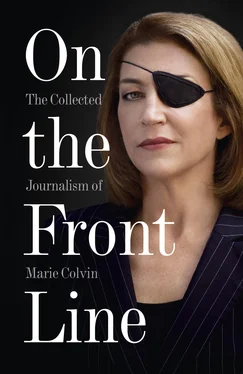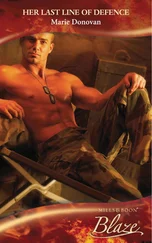At 10.30am I was standing in front of the ministry of information, now deserted despite the minister’s brave words just hours earlier, as a thud sounded and a mushroom of smoke went up from the defence ministry about half a mile away. Two more thuds shook the building. Neither a plane had been visible nor an engine heard. Anti-aircraft fire went up but it was too late.
Driving by the ministry – an old Ottoman building still marked the Abbassid Palace on tourist maps and so secret that a government official once told me it was a museum – I could see flames in the central section. A wing had been flattened as if by a giant fist.
The reaction from soldiers in the barracks across the street from the defence ministry was as surprising as the suddenness of the attack. They stood standing and watching the fire as if it was a show unconnected to them. Nobody seemed to be in much of a hurry to put it out. Like the foreign ministry, the defence department must have transferred its operations elsewhere in the days before the deadline.
As I drove around town, the calm and lack of panic were impressive. Orderly lines formed for bread and cars queued for petrol. It was a far cry from the day after the bombing of the Libyan city of Tripoli, when Libyans crashed their cars into each other trying to flee, the government disappeared and rumours that Colonel Gadaffi had been overthrown filled the capital.
Baghdad’s militiamen had appeared overnight to keep order. In the Amriyah area, a civilian neighbourhood, six teenagers dressed in jeans and jackets walked along the streets with Kalashnikov assault rifles casually slung over their shoulders. A man in a cheap suit and a keffiyeh Arab headdress manned an anti-aircraft gun placed in the bed of a Nissan pick-up truck at a crossroads. But there were no new checkpoints, nor was there hostility towards foreigners.
Saddam came on Baghdad radio at 12.40 in the afternoon, speaking in calm and confident tone: ‘At 2.30am the great duel started. The valiant sons of Iraq, your brothers, sons and fathers, confronted the invaders. Damn King Fahd, the traitor of Mecca, damn the invaders, damn these criminals. We shall win. The dawn will break and they will be damned.’
My taxi driver, taking me back to the hotel, said he was not at the front because he had a piece of shrapnel still in his head from the Iran war. It hurt when the weather got cold. Like most Iraqis that day, he appeared worried but unfazed. ‘I did not think we should have taken Kuwait,’ he said. ‘I don’t agree with this. But the Americans should not come to Iraq. Iraqi soldiers will fight for Iraq and for Saddam. We have fought for eight years against Iran and they cannot frighten us.’
This was the mood of Baghdad under fire. An Iraqi businessman explained to me why people were so calm. Listening for weeks to the propaganda from Washington, they had expected Armageddon. Now that the bombing had come at last and they had survived, he said, their attitude was: ‘Well, if that’s it, we can take it.’
People had even begun to listen for the first time to Iraqi radio, and to believe its propaganda, because they felt that the BBC and Voice of America had lied about allied successes against the air force and missile sites in the first attack.
In addition, the government maintained at least a semblance of control. The city was without water or electricity, and the streets began to smell of sewage and cordite. But soldiers directed traffic in place of traffic lights, papers continued to publish daily, and the television news appeared every night at the same time, with its usual announcer, and on the same television studio set.
Only a few shops opened; and prices were astonishing: I saw a bottle of whisky, a packet of cigarettes and three Mars bars bought for 147 dinars, the equivalent of $441 at the official rate and equal to three-quarters of the monthly salary of a middle-ranking government official.
But in the poor neighbourhoods such as Saddam City, where more people had remained because they had no way of escape, and which the regime regards as its centres of support, government lorries distributed bread under normal ration regulations.
Anti-aircraft fire erupted sporadically during the day. Tracer fire, the thud of guns and falling bombs filled the night, but there were few civilian casualties.
There were makeshift shelters to be found almost anywhere in the city. Driving back to the hotel, I ducked into Baghdad Hotel when anti-aircraft guns went off at the nearby presidential palace. The discotheque had been turned into a bomb shelter and guests were handed candles at the door. People were worried but there was still an air of unreality. ‘Palestine seems closer than it has for 40 years,’ said a Palestinian businessman also sheltering inside.
Baghdad’s survival and the news that Saddam had launched Scud rockets at Israel had many Palestinians and their Iraqi supporters still believing that he would achieve his goal of somehow freeing Palestinian land from Israel.
As the sun set on Friday, I watched two orbs of light streak low across the city skyline, just missing the rooftops, and smash into the Dora oil refinery. A huge ball of fire erupted and smoke drifted back over Baghdad.
Bombing continued sporadically that night and at dawn the refinery had only three instead of four chimneys. The 20-storey communications tower which had lost its top three storeys to an unseen missile on Friday, as if to an invisible hand, had completely disappeared from the skyline by Saturday morning.
On Saturday afternoon, I was gazing idly from a fifth-floor window across the Zawra zoo park opposite the hotel when I suddenly realised that a cruise missile was heading above the trees straight for us. It seemed to be white. I could see its little fins. There was no smoke trail coming from it.
I thought it was going to hit the hotel, and I yelled out. But it turned right and skirted the building, as if following a street map, and hit the old parliament building about half a mile away, sending up a white pall of smoke.
Another cruise landed even closer, disappearing with a deafening crash into breeze-block staff quarters next to the hotel. The huts burst into flames and shrapnel showered the lawn and swimming pool. Glass from broken windows littered the hotel lobby as hotel workers dragged an electronic circuit board into the air-raid shelter, dancing around it, ululating and shouting that they had downed an American plane.
It was a relentless afternoon attack. At least two more missiles hit the Dora refinery again, sparking a fire that lit Baghdad with a beautiful rose glow late into the night.
Conditions at the Rashid hotel were becoming primitive. Electricity remained off and journalists worked at night by candlelight. Sanitation had broken down, toilets could not flush, and we had been washing in the swimming pool.
The officials minding us had had enough. They had stayed in the shelter for days and had not seen their families nor been able to contact them by telephone. They were worried about our safety and about the detail of what we were reporting. We were ordered to leave.
On Saturday night, as I packed and sat up late with other journalists discussing our departure, a Palestinian friend stopped by to say farewell. An articulate, educated man, he was trying to explain why so much of the Arab world had come out in support of Saddam despite his invasion of Kuwait and oppressive policies at home.
‘You must understand that if Saddam goes, no Westerner will be safe walking down an Arab street. I will pick up a machinegun and fight the Americans. A year ago I would have told you I hated Saddam and his regime. But he has become a symbol for us. Saddam is the result of the humiliation of the war of 1967 and of all the humiliations we have suffered from the West. If we let you destroy Saddam now, you will destroy all of us Arabs again.’ He added: ‘It is a question of dignity. Saddam came along with his rockets and stood up to you and we said, “Why not?”’
Читать дальше












